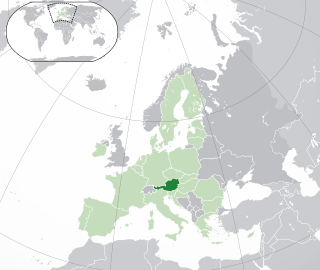
Lesbian, gay, bisexual, and transgender (LGBT) rights in Austria have advanced significantly in the 21st century. Both male and female same-sex sexual activity are legal in Austria. Registered partnerships were introduced in 2010, giving same-sex couples some of the rights of marriage. Stepchild adoption was legalised in 2013, while full joint adoption was legalised by the Constitutional Court of Austria in January 2015. On 5 December 2017, the Austrian Constitutional Court decided to legalise same-sex marriage, and the ruling went into effect on 1 January 2019.

The Federal Ministry of the Interior, Building and Community, abbreviated BMI, is a cabinet-level ministry of the Federal Republic of Germany. Its main office is in Berlin, with a secondary seat in Bonn. The current minister of the Interior, Building and Community is Horst Seehofer. It is comparable to the British Home Office or a combination of the US Department of Homeland Security and the US Department of Justice, because both manage several law enforcement agencies.

The Federal Ministry of Justice and Consumer Protection, abbreviated BMJV, is a cabinet-level ministry of the Federal Republic of Germany. Under the German federal system, individual States are most responsible for the administration of justice and the application of penalties. The Federal Ministry of Justice devotes itself to creating and changing law in the classic core areas related to Constitutional law. The Ministry also analyzes the legality and constitutionality of laws prepared by other ministries. The German Federal Court of Justice, the German Patent and Trade Mark Office (GPTO), and the German Patent Court all fall under its scope. The ministry is officially located in Berlin.
Same-sex marriage in Austria has been legal since 1 January 2019, following a decision of the Constitutional Court on 4 December 2017. The country has allowed registered partnerships since 1 January 2010.
The government of Hamburg is divided into executive, legislative and judicial branches. Hamburg is a city-state and municipality, and thus its governance deals with several details of both state and local community politics. It takes place in two ranks – a citywide and state administration, and a local rank for the boroughs. The head of the city-state's government is the First Mayor and President of the Senate. A ministry is called Behörde (office) and a state minister is a Senator in Hamburg. The legislature is the state parliament, called Hamburgische Bürgerschaft, and the judicial branch is composed of the state supreme court and other courts. The seat of the government is Hamburg Rathaus. The President of the Hamburg Parliament is the highest official person of the Free and Hanseatic City of Hamburg. This is a traditional difference to the other German states. The president is not allowed to exert any occupation of the executive.

The Judiciary of Austria is the branch of the Austrian government responsible for resolving disputes between residents or between residents and the government, holding criminals accountable, making sure that the legislative and executive branches remain faithful to the European and Austrian constitutions and to international human rights standards, and generally upholding the rule of law. The judiciary is independent of the other two branches of government and is committed to guaranteeing fair trials and equality before the law. It has broad and effective powers of judicial review.

Sebastian Kurz is an Austrian politician who has served as Chancellor of Austria since January 2020, a position he previously held from December 2017 to May 2019. Kurz has also been chairman of the Austrian People's Party since May 2017.

The Supreme Court of Justice in Austria is the final court of appeal for criminal and civil lawsuits other than administrative. The court also deals with service-related complaints by jurists against the judiciary and with disciplinary complaints against jurists; it acts as the trial court in cases involving certain senior judges and prosecutors, as an appeals court in cases involving lower-level judges and prosecutors, attorneys, and notaries. In addition to its adjudicative responsibilities, the court is charged with running the Republic's official public law library and with publishing appraisals of draft legislation presented to the National Council by the government.

Katarina Barley is a German politician and lawyer who has been a Member of the European Parliament since 2019. She served as Federal Minister of Justice and Consumer Protection and as Federal Minister of Family Affairs, Senior Citizens, Women and Youth in the fourth Cabinet of Angela Merkel. Prior to that, she had served as acting Federal Minister of Labour and Social Affairs from 28 September 2017, both until 14 March 2018.

Gerhart Holzinger is an Austrian jurist, educator, and career civil servant. He was appointed to the Austrian Constitutional Court in 1995, serving as its president from 2008 until his retirement in 2017.

In Austrian politics, the Federal Ministry of Agriculture, Regions and Tourism is the ministry in charge of agricultural policy, forestry, hunting, fishing, viticulture and wine law, postal and telecommunications services, mining, animal welfare, and the tourism industry. The Ministry was first created in 2000 through a merger of the Ministry of Agriculture (Landwirtschaftsministerium) and the Ministry of Environment (Umweltministerium); it gained responsibility for the energy sector, mining, and tourism under the first Kurz cabinet in 2018.

In Austrian politics, the Federal Ministry for Digital and Economic Affairs is the ministry in charge of promoting commerce and industry, overseeing public works, and maintaining the public infrastructure. In some recent cabinets, it has also been responsible for employment; in others, for family affairs and science.

Brigitte Bierlein is an Austrian former jurist who served as Chancellor of Austria from June 2019 to January 2020. An Independent, she was the first female Chancellor of Austria.

In Austrian politics, the Federal Ministry of Social Affairs, Health, Care and Consumer Protection is the ministry in charge of welfare policy.
Bernd-Christian Funk is an Austrian legal scholar and educator. Funk is a former professor of Constitutional and Administrative Law at the University of Vienna, the dean and academic director of the Sigmund Freud University Vienna Faculty of Law, and one of the governors of the Medical University of Innsbruck.
Theodor "Theo" Öhlinger is an Austrian constitutional scholar and educator. Öhlinger was a member the Austrian Constitutional Court from 1977 to 1989 and a professor of constitutional and administrative law at the University of Vienna from 1974 to 2007. Since 1999, he has been serving as the deputy chairman of the board of trustees of the Vienna Museum of Art History. Öhlinger has published 23 books and more than 350 scholarly articles and appears as a frequent commentator on legal issues in the Austrian news media. Austrian President Alexander van der Bellen called him Austria's "operating system" during the turbulent times of May 2019.

Karl Korinek was an Austrian constitutional scholar and educator. Korinek taught law at the University of Graz, the Vienna University of Economics and Business, the University of Vienna, and the Danube University Krems. In 1978, Korinek was appointed to the Austrian Constitutional Court; he served as the president of the court from 2003 until his retirement in 2008.

Ludwig Karl Adamovich, commonly known as Ludwig Adamovich Jr., is an Austrian constitutional scholar, civil servant, and educator. From 1956 to 1984, Adamovich worked for the Constitutional Service of the Austrian Chancellery; he also taught law at the University of Graz. From 1984 to 2002, he served as the president of the Austrian Constitutional Court. Since 2004, Adamovich has been acting, on an honorary basis, as an advisor on matters of constitutional law to Presidents Heinz Fischer and Alexander Van der Bellen.

In Austrian constitutional law, a minister is a member of the national cabinet. Most ministers are responsible for a specific area of Austrian public administration and stand at the head of a specific department of the Austrian bureaucracy; ministers without portfolio exist and used to be common in the First Austrian Republic but are rare today. Most ministers control a ministry; some ministers control a section of the Chancellery, the ministry headed by the chancellor. A minister is the supreme executive organ within his or her area of responsibility: ministers do not take orders from either the president or the chancellor; their decisions are subject to judicial review but cannot be overruled by any other part of the executive branch.

Verena Madner is an Austrian legal scholar, university professor and constitutional judge. She has been Professor of Public Law at the Department of Socio-Economics at the Vienna University of Economics and Business since 2011. In 2020, she was appointed Vice President of the Austrian Constitutional Court.

















